IN FOCUS: The challenges in uncovering abuse of foreign domestic workers

Photo illustration of a woman being physically abused. (Photo: Jeremy Long)
SINGAPORE: When Ms Piang Ngaih Don died in July 2016, aged 24, she had been beaten, starved and tied to a window grill at night.
Days before her death, the foreign domestic worker from Myanmar only weighed about 24kg.
She was about a year into her employment the night her employer, Gaiyathiri Murugayan, killed her.
The prosecution described the crimes as an “indisputable horror and monstrosity”, calling for the law to “come down with full force to appropriately vindicate the fundamental values of society and human dignity that have been violated in this case".
Details of the abuse shocked the nation, raising questions on how the abuse had gone undetected and what could be done to stop this from happening again.
Her employment agency had spoken to her twice in her first six months of employment and according to the Ministry of Manpower (MOM), “did not pick up on any issues”.
Gaiyathiri started physically abusing Piang Ngaih Don in October 2015, five months after hiring her.
Although Gaiyathiri’s husband, Kevin Chelvam, had provided feedback to the agent about communication problems and the helper’s work performance during her first six months of employment, he did not take up the agent’s offer to replace her.
Then, a doctor saw the woman in January 2016 for a routine medical examination and passed her. She saw her once more in May 2016 for a runny nose, cough and swelling on her legs. Although the doctor observed bruises around Piang Ngaih Don's eye sockets and cheeks, Gaiyathiri explained that her employee fell down frequently as she was clumsy.
READ: Myanmar maid's death: Employer hires new lawyer, wants to reduce culpable homicide charge
READ: Myanmar maid's death: Murder charge for employer was reduced based on evidence, says Shanmugam
In the aftermath of Gaiyathiri’s trial, MOM said that it is reviewing the reporting system for doctors conducting the mandatory six-month check for foreign domestic workers. In addition, MOM officers are now interviewing maids about their living and working conditions.
Why can it be hard for abused maids to get help? To find out, CNA spoke to NGOs about how to improve the situation, as well as a former maid who was subjected to abuse and struggled to find help.
A LIVING NIGHTMARE
It was morning when Yulia dialled in for a Zoom interview with CNA, speaking in Bahasa Indonesia from her village eight hours away from the capital of Bandar Lampung province. She was dressed simply, sitting cross-legged on the floor against the wooden wall of her home. In the background, there were the occasional sounds of crowing roosters.
According to Yulia, who goes by one name, she first arrived in Singapore in July 2016. She had spent two weeks with her employer, Ong Si Mien, when Ong started physically abusing her.
Over the course of two months and a week, Ong slapped, punched and hit Yulia with kitchen utensils, a metal bowl and a cordless phone. On one occasion, she splashed near-boiling water over Yulia’s arm.
After Ong denied her employee’s request to return to the maid agency, Yulia ran away in September 2016.
In March this year, Ong was sentenced to six months’ jail after pleading guilty to three charges of voluntarily causing hurt.
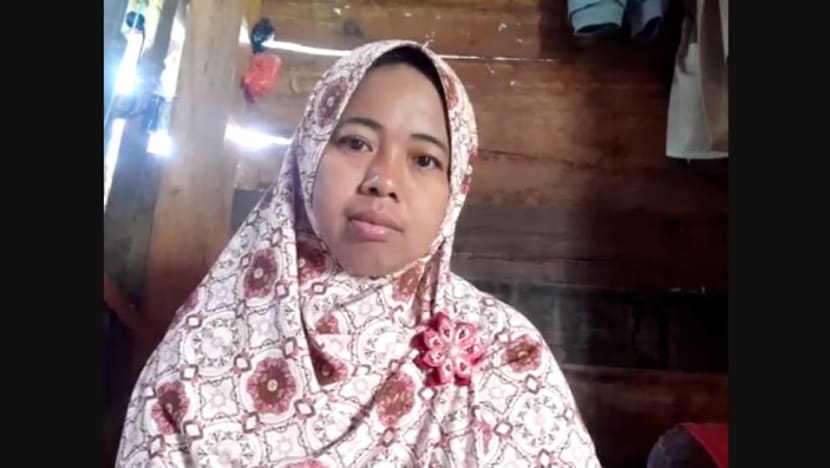
The Humanitarian Organization for Migration Economics (HOME) told CNA that it receives about 15 cases of alleged maid abuse a week. These cases comprise verbal, physical and sexual abuse, said casework manager Jaya Anil Kumar.
About 75 to 80 per cent of the cases that HOME sees allege some sort of verbal abuse, while 12 to 15 per cent of cases involve allegations of some form of physical abuse.
Verbal abuse includes cases where domestic workers are repeatedly scolded while working, with some crossing over into criminal intimidation.
READ: IN FOCUS: Will rising costs and reduced availability change Singapore's relationship with maids?
“When anyone else goes to work, they don’t expect to hear swear words, they don’t expect to be called names, they don’t expect to be called derogatory terms. But a lot of domestic workers face this and it’s definitely the most type of abuse that we see,” said Ms Jaya.
She added that most people imagine physical abuse to “whack (the domestic worker)”. But even a pinch would be considered physical abuse, she said.
“You don’t go to work and expect to be pinched by your employer,” she said. “None of us go to work expecting to be treated like this.”
Although it declined to share the exact number of calls it receives per day about possible cases of maid abuse, Centre for Domestic Employees (CDE) executive director Shamsul Kamar said that it has handled “numerous” alleged physical abuse complaints.
ISOLATION MAKES ABUSE HARD TO REPORT
Isolation is one reason cited by those CNA spoke to as to why cases of abuse can be difficult to uncover. A maid may not have her own phone, or may not know what helplines to call. She may not be able to use the phone without her employers overhearing the call.
Some workers may not be allowed to leave the house or may have agreed to an arrangement with no days off. Currently, workers are given a weekly rest day by law, but they can agree to work on their rest day if the employer compensates them.
All these were issues for Yulia. According to her, while working at Ong’s home, she was not allowed to leave the house except to sweep the area in front of it and take out the trash.
“During that incident, I couldn’t share about it with anyone because I didn’t have any day off and I wasn’t using any mobile phone,” she said, adding that she also did not have friends in the neighbourhood because she was not allowed to leave the house.
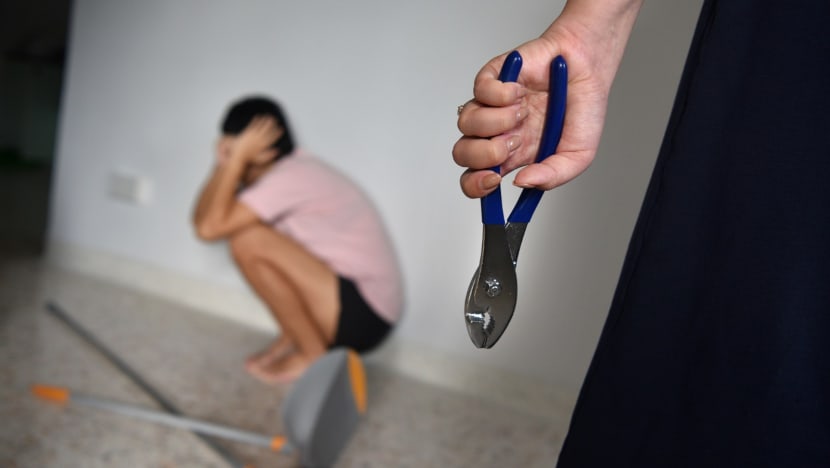
She also did not know who she could call to report what was happening to her, she told CNA. Her employer was at home most of the time, which also gave her limited opportunities to use the phone.
A lack of accessible communication is the “biggest challenge “ for a maid trapped in an abusive employment relationship, said Mr Shamsul.
The perpetrator could be watching the foreign domestic worker closely, limiting their means of communication.
“However, CDE has intervened in cases where FDWs (foreign domestic workers) managed to seek help by throwing out notes from the windows or passed notes to other FDWs in their neighbourhood,” he said.
The workers who can contact NGOs for advice are those who have access to a phone, said Mr John Gee, a volunteer with Transient Workers Count Too (TWC2).
“But most of the people who suffer from physical abuse - they don't have days off, and their phones are either taken away from them, or they can only use a phone under supervision of an employer,” he added.
In most cases featuring extreme violence that made it to court, most of the workers were denied access to the outside world, said Mr Gee.
“An employer basically has absolute power over a worker in those circumstances. And so, what is the worker to do?”
A domestic worker who might have come from a village and is new to Singapore could be afraid of stepping out to navigate the city, Ms Jaya noted. This would contribute to her sense of isolation.
But Singapore can “structurally” reduce the isolation that domestic workers face, she suggested.
MANDATORY REST DAYS REDUCE ISOLATION
All the NGOs that CNA spoke to stressed the importance of a day off for foreign domestic workers.
Mandatory rest days would be an “immediate first step” to reduce the isolation of domestic workers, Ms Jaya told CNA, as rest days give domestic workers a chance to leave the house and seek help.
It also adds to a domestic worker’s physical and mental well-being, as it gives them a respite from physically demanding household chores and lets them step away from where they live and work.
The current system allows foreign domestic workers to give up their rest days for extra pay. While this is meant to give foreign domestic workers an option, many of them do not really have a true choice, she said.
For instance, a foreign domestic worker may arrive with six months of debt, accrued through the process of coming to Singapore to work. Because she earns no income in those six months, she might decide against having a rest day to earn an extra S$80 to S$100 to send home, said Ms Jaya.
READ: ‘I want you to suffer with me’: What drives people to torture, enslave someone at home?
In another scenario, a domestic worker could lose her job if she does not agree to give up her rest days.
If a worker can go out or leave the house, she can run away from the abusive employer if she is “desperate enough”, said Mr Gee.
“If all she needs is advice, then she's got a chance to speak to other people, including other domestic workers and get their advice, without having an employer or any members of the employer’s family, listening in or looking, waiting, at her shoulder, he added.
“That's what will make the decisive difference. And anything short of that is really going to leave workers still vulnerable to abuse.”
A compulsory and non-negotiable day off is also a “preventive measure” because if employers feel frustrated or short-tempered and want to take it out on the domestic worker, they would “think twice” if the domestic worker could go out a few days later and make a complaint, said Mr Gee.
“Or even if she didn't say a word, people could see marks of physical violence upon them. So that deters, we’ll see the cases really, really fade away, not absolutely disappear, because you can never guarantee 100 per cent, but they should become vanishingly small,” he said.

THIRD PARTIES SHOULD INTERVENE
Although there were other people in the house, Yulia was still isolated. Her employer lived with her husband, their two children and her husband’s mother, but the abuse continued until Yulia’s escape.
According to court documents, sometime in late July or early August 2016, Ong used a metal bowl to hit Yulia’s head, leaving the bowl dented afterwards.
When Yulia approached Ong’s husband to ask for a transfer back to the agency, Ong told Yulia that she was not allowed to be transferred and scolded her for talking to her husband.
And on the day of Yulia’s escape, Ong slapped Yulia for putting her son’s pants on wrongly. Court documents noted that it was a “hard slap” that caused Yulia’s nose to bleed.
Like Yulia, many domestic workers are not very aware of their rights, said Ms Jaya, especially first-time domestic workers. Many of them do not know where to seek help, which is why external help is “very important”.
This could include agents checking in on them and members of the public reaching out to NGOs if they feel something is amiss.
READ: Pregnant woman jailed for abusing maid, making her eat hair and cotton wool
For domestic workers living with families, they are “in a minority” compared to their employers, said Mr Gee.
“In a normal workplace, you have an employer and a few people who assist the employer, and many employees. In the family home, often the family will sympathise with an abuser or maybe even be taking part in abuse themselves, and the worker is on her own,” he added.
“So she will sometimes feel, well, who's going to believe me? It's my word against the word of four or five people. What chance have I got of being taken seriously?”
If they are not allowed to step out of the house or speak to other people, these domestic workers may come to believe that this is what domestic work is like, said Ms Jaya.
They may think that they just have to “grin and bear it”, not knowing that what they are going through is wrong, she added.
This is why third party intervention “has to happen”, or abuse may not be uncovered, said Ms Jaya.
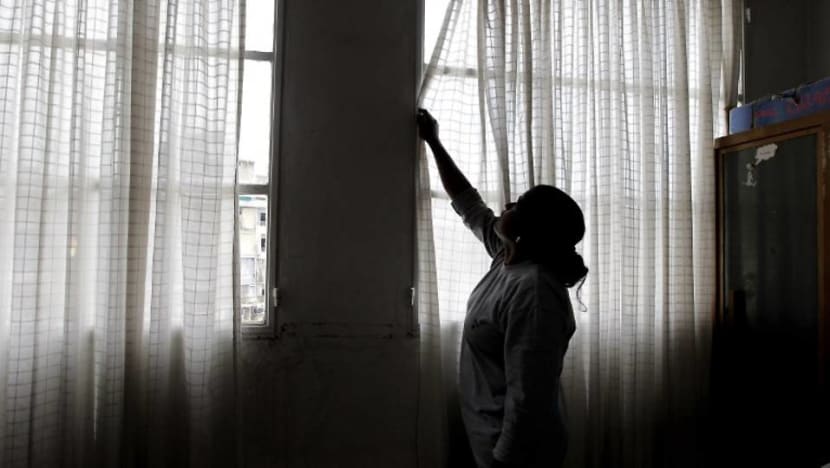
HOME noticed a 10 to 15 per cent increase in the number of concerned phone calls from the public in the aftermath of Piang Ngaih Don’s case, especially after news reports and social media posts made their rounds online.
Members of the public often called saying that something was “not quite right” about a domestic worker’s situation, whether it was the domestic worker never coming out of the house or hearing a lot of shouting from the household.
In such cases, HOME usually advises members of the public who call in anonymously to give the organisation’s helpline number to the domestic workers.
The immediate source of help for foreign domestic workers, if they do not have access to a phone, are neighbours and friends living near them, said MP Yeo Wan Ling (PAP-Pasir Ris-Punggol), urging the public to call the police if they suspect that a foreign domestic worker might be physically abused.
Ms Yeo raised questions in Parliament in March about what could be done to nip foreign domestic abuse in the bud in the aftermath of Piang Ngaih Don's case.
The last straw for Yulia came when her employer slapped her face and caused her nose to bleed. The court heard that on that occasion, Ong had scolded Yulia for putting her four-year-old son’s pants on in the wrong way.
“She snatched the shorts, she slapped my face with it, and then she told me to stand up. Then she hit my nose to the point my nose bled,” Yulia told CNA.
After noticing that her nose was bleeding within view of her four-year-old son, Ong told Yulia to quickly go to the toilet to wash off the blood.
“So I washed my face. After that, she returned to scold me and told me to go to her room. After going to her room, she slapped me again,” she continued.
READ: Woman charged for abusing maid, failing to pay salary on time
READ: Indonesian maid in alleged abuse case given support and assistance: Centre for Domestic Employees
While washing her face, Yulia decided she had to escape the flat.
“I thought that after so many incidents, the incident before I was hit twice a day, I started thinking that if I don’t escape or run away from here, I might be dead in my employer’s house … And I didn’t want to continue being abused,” she said.
"Because my employer did say to me that this is training. She said that this is training and you have to go through this training for two more months.
“I didn’t want to go through any more abuse … I don’t want a training that physically hurts me or towards any other domestic workers or anybody else.”
Ong left the flat after the incident and Yulia used this opportunity to run away - she had not received any of her salary at this point and only had some coins from Indonesia.
At about 9.30am, she took her belongings and walked to the Jalan Kayu-Seletar area, ending up at a bus stop.
She had no idea where to go and what to do next.
LONG PROSECUTION PROCESS MAY DETER REPORTING
At the bus stop, Yulia met a woman who spoke Malay who offered to help her.
“I told her that my employer abused me and I could see on her face that she was very shocked … she was ready to help me to call my agency,” she added. But there was no answer on the phone because the agency had yet to open.
The woman then suggested calling the police, but Yulia rejected this idea because she did not want the police involved.
“I rejected her offer to contact the police because I was afraid that the case would be stretched,” said Yulia. It was only after the woman reassured her that the police would help that Yulia agreed.
Cases can take a few years to be processed, said Ms Jaya, and this can be an obstacle for some maids to report their case.
Yulia’s case took about four years to conclude, and she went through “stressful periods” as she did not know when she could expect to return home to Indonesia.
Some domestic workers “naturally” want to see perpetrators of abuse be brought to justice, said Ms Jaya, but the knowledge of having to go through the criminal justice process and answering detailed questions about the abuse sometimes hampers reporting.
An issue linked to the police investigations is the maids’ ability to continue working.
While they are usually allowed to work when assisting police in abuse cases, many prospective employers would be slow to hire domestic workers who have ongoing cases, said Ms Jaya: “The fear is generally that, okay she’s made this allegation against the previous employer, what if she makes the same allegation against me?”
About 15 minutes after the police report was made, officers arrived and started asking Yulia for identification and her employer’s identity.
“My mind was very blank at that moment because I was very afraid and traumatised from that incident,” she said in tears.
“So in the end, I fainted on the streets.”
UNABLE TO WORK, WAITING FOR JUSTICE
Most foreign domestic workers come to Singapore to earn a higher income to provide for their families back home, said Mr Shamsul.
Being “economically dependent” on their employers and with the “perceived power imbalance”, they become reluctant to report abuse incidents for fear of losing their jobs or being sent home.
“In fact, through our interactions with many of our physically abused cases, they shared that they had hoped for things to get better as time went on and thus kept quiet,” he said.
This is “more acute” during the loan period, where they might be repatriated by the employers and incur huge debts that they are unable to pay off, added Mr Shamsul.
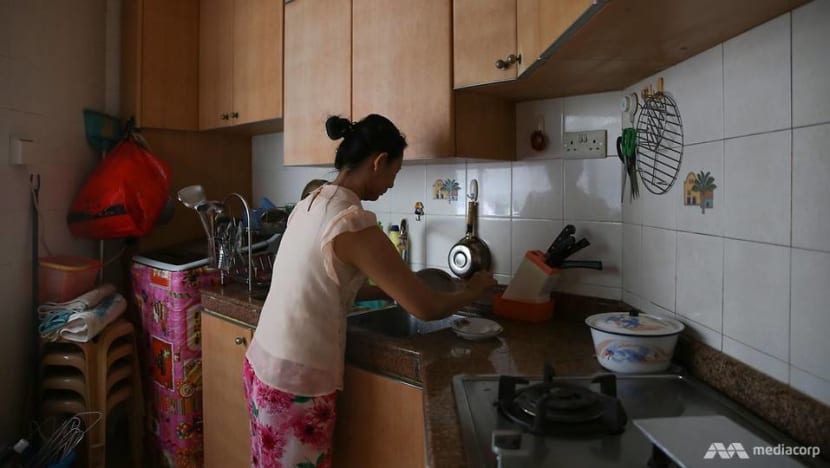
After running away from Ong, Yulia lived at the CDE shelter for more than a year and did not earn any money as she was not working. As a result, she could not send any money back home and had to tell white lies to her parents and son to explain why.
The family paid her the salary they owed her after she ran away. She was supposed to earn S$540 per month with them, including her day-off compensation. Some of it went into repaying the loan she took when coming to Singapore.
After settling the loan, she walked away with a total of S$410.
After about a year at the CDE shelter, they found an employer who knew about her plight and was willing to take her in. But Yulia spent just six months with that family before returning to the CDE shelter, as she still felt traumatised from the abuse.
“I started to think that maybe something similar to my first employer might happen here again, so from there, I think that I need to quickly escape by quitting work at this house.”
Yulia moved to the HOME shelter shortly after, where she received an allowance of S$250 per month. She scrimped and saved on daily expenses and managed to send some money home, she told CNA.
When speaking to the police and staff at HOME, Yulia initially asked what would be the fastest way to “solve” this problem without going through court sessions and many interviews, she recalled.
“I was very tired of going through this situation and I had no freedom to think or do other things, other activities,” she added.
“From there, I continued thinking of a solution but after HOME and the police explained to me, they said that I can’t do this because this incident is a breach of the employment agreement.
"So they suggested that I be patient and wait for the process to be completed.”
After finally returning to her village in July 2020, Yulia decided to tell her family everything that happened after her first week back home.
“They didn’t expect that such an incident would happen and they were really shocked. They asked me why I did not tell them about what happened all this while,” she recalled, adding that her parents cried after hearing about the abuse.
“I felt relieved in my heart. The uneasiness went away. And they were very grateful that the worst did not happen to me.
“Initially they couldn’t accept it. They couldn’t accept that I was mistreated like that with my ex-employer but I told them let’s just sincerely accept it, and hopefully God will bring justice and we pray for the person to become a better person in the future.”
She also shared parts of her ordeal with friends and other family members to warn them to be careful if they want to work overseas, Yulia said.
“My advice for people who want to work overseas is to please be careful and hopefully in the future, there will not be any more of such incidents,” she added.
WHAT AGENCIES CAN DO
Agencies and embassies could help protect foreign domestic workers, said Yulia, by providing instructions for each worker coming into the country. MOM or the embassy could also visit the employer’s home regularly to find out how the workers are doing, she added.
On Apr 26, MOM said that its officers will visit maids to check on their conditions. Such visits started on Apr 5. The officers will check on the maids’ working and living environments and remind them and their employers about safe working conditions and channels to seek assistance from.
The ministry also plans to expand in-person interviews to all first-time maids by the end of the year.
Employment agencies are the most important point of contact for foreign domestic workers, said Ms K Jayaprema, who is president of the Association of Employment Agencies (AEAS).
“They are the ones who bring the domestic worker in. They are her first point of contact before she comes to Singapore, at the point when she lands in Singapore and at the point of being deployed.
“To a domestic worker, the employment agency is the familiar face. So I think (the most important role) has to be held by the employment agency,” she said.
But currently, there is not much agencies can do to screen prospective employers, said Ms Jayaprema, as there is “no mechanism” for them to identify errant or abusive employers.
Since the introduction of the Personal Data Protection Act in 2012, agencies no longer have access to employer records, which means they have no insight into an employer’s hiring patterns - for instance, if they changed foreign domestic workers frequently.
“From there we used to form an opinion, and we used to be able to ask the employer why were they changing so frequently. Now … we depend on the employer to be the one to tell us that (they) have changed maids so many times,” she said.
As such, employment agencies have to size up employers by looking at their requirements and make a “judgment call” when engaging the customer.
READ: Jail for woman who asked maid to punch herself and strike her teeth with meat pounder
Agencies look out for continuous rest for the domestic worker during the night, said Ms Jayaprema. If this is not possible, then agencies will negotiate with employers for extra rest time during the day.
“We try to manage the expectation of the employer,” she said, adding that this extends to food allocation as well.
For agencies under the AEAS, the association requires agencies to ask employers to fill out a job scope for the domestic worker, resting hours and food habits in the home to “narrow down to the pain points” and advise employers on areas for improvement.
There have been cases where agencies have even turned employers away, whether due to feedback from previous domestic workers, or the fact that the employers change domestic workers too frequently, she said.
WHAT AGENCIES WANT
There are four changes the association would like to see, Ms Jayaprema told CNA.
The first is the ability to trace the hiring history of employers with their permission. “As much as the employer is entitled to look at the employment history of a domestic worker, why not an FDW can also get to know what’s the hiring pattern of the employer," she said.
This could take the form of a portal, with details of the employer online, she suggested.
Agencies also want mandatory check-ins with the domestic worker, either at the agency’s office or the employer’s home.
Third, agencies want more regulations on domestic workers who are directly hired by their employers, as there is a question of “safeguarding their interests”.
Many of them might be “silently suffering”, as they were brought into Singapore by their employers and have no access to any other help, she said.
“Maybe it’s about time that we don’t have it, and employment agencies should be involved in every foreign worker, domestic worker's hiring in Singapore.”
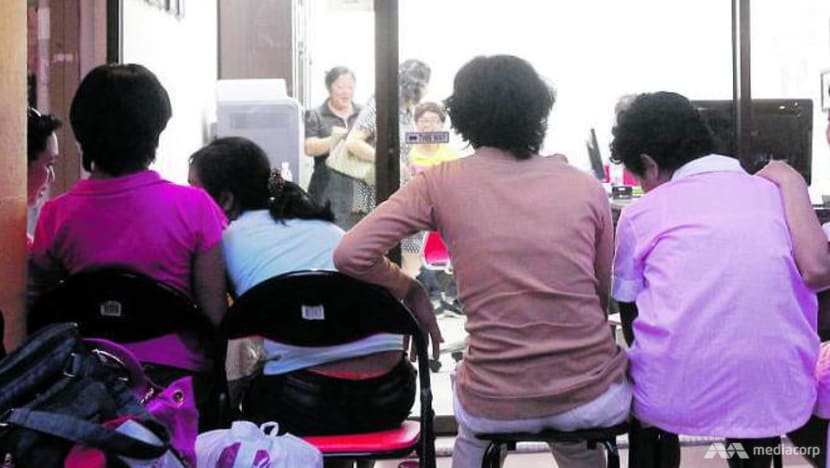
While every domestic worker has to go through the settling in programme, it is done within the first five days of their arrival. Said Ms Jayaprema: “What we’re looking at is after the domestic worker is deployed into the house, what happens. And that’s when it can go untracked, unnoticed.”
In addition, it should be compulsory for employers to inform agencies when they send their domestic workers home, and the agency should have the chance to speak to the domestic worker and make sure all her affairs are settled.
Cases of abuse could also go unnoticed when employers send the domestic worker back, she added. “Because very often, at the point of cancellation of permits, nowhere does it state that the employer must inform the agency.”
Although some agencies might put it in the contractual agreement with employers, it is not mandatory, said Ms Jayaprema.
STEPS TAKEN BY MOM AND WHAT’S NEXT
After Piang Ngaih Don’s case made waves in Singapore, multiple Members of Parliament raised concerns about foreign domestic worker abuse in March.
The Government is reviewing measures, including enhancing the one-on-one interviews after newly arrived workers start work with their employers and compulsory days off so that workers have a better chance at seeking help, said MOM.
All newly arrived foreign domestic workers are educated on their rights and channels to seek help if they encounter any wellbeing issues, said Minister of State for Manpower Gan Siow Huang in response to a parliamentary question raised by Member of Parliament Gerald Giam (WP-Aljunied) in March.
“For example, foreign domestic workers can call the police if they are abused, or the hotlines set up by MOM or CDE if they have employment difficulties or other well-being issues,” she added.
MOM also works with CDE to conduct interviews with first-time foreign domestic workers in their native language within the first few months of their employment, said Ms Gan.
“It is a form of check-in with the workers to ensure that they have settled well in their jobs. It also helps us detect problems and cases of abuse early,” she said.
READ: MOM may require employment agencies to check in on foreign domestic workers: Gan Siow Huang
“We also rely on public members, neighbours, the community at large to help spot cases of mistreatment of foreign domestic workers. Going forward we’ll want to look at other ways to strengthen the touchpoints that will allow us to detect cases of abuse early,” said Ms Gan.
To lower these barriers to reporting abuse, MOM should provide communication channels for domestic workers who have no phone or days off to report abuse, and employment agencies should be required to regularly check on the welfare of the workers, said WP’s Mr Giam.
“At the same time, safeguards must be put in place to protect employers who may be falsely accused of wrongdoing,” he told CNA.
Mr Giam, who raised the issue in Parliament, said there should be enhancement of the education that is currently provided to those who employ foreign domestic workers on their duty to care for the workers and what kind of behaviour might constitute abuse.
Employers should also be examined for past incidents of violent behaviour, police reports made against them and other red flags before being allowed to hire domestic workers, he said.
A “harmonious employment relationship” between employers and foreign domestic workers is key to preventing further cases of abuse, said Ms Yeo, who is also the director of NTUC’s U SME and Women and Family Unit.
She welcomed the move for medical professionals to play a greater role in detecting possible cases of abuse during the six-monthly examination of foreign domestic workers.
“Medical professionals have a duty of care to report suspicious-looking injuries even when FDWs chose to remain mum,” she said, adding that medical professionals could use pictorial diagrams or translated printouts to better understand the medical needs or messages of foreign domestic workers.
After returning to Indonesia, Yulia cooked and cleaned at her neighbour’s house for about S$150 per month for a while, but she now stays at home because her parents and son need her around, she told CNA.
READ: Demand for new maids high despite extra costs amid COVID-19 restrictions, risk of imported cases
She currently earns S$2.50 per day packing fish keropok. Her mother works on a farm and her father rears fish to be sold.
“With that amount of income, it’s very difficult to pay for daily necessities, for my son and for other needs,” Yulia said.
“At the moment, I’m just going with the flow, but what’s important is that I work hard and pray that in the future, I hope I would be able to earn more than I am now,” she added.
“I don’t have savings so I’m just enduring.”
Despite her bad experience with working as a domestic worker overseas, Yulia still hopes to work overseas again in the future, in Singapore or other countries.
If she returns to work for a new employer, Yulia said she would also note down important contact numbers, like the Indonesian embassy, MOM or the police.
“Of course, the trauma still remains in me and for me to start working with a new employer in a new country, I’m still doubtful, or still traumatised,” she said.
“Sometimes I feel sad especially when I recall the bad experiences I faced in the past ... like why did it happen this way, why wasn’t I as fortunate as my other peers?
"But I'm also grateful ... Even though what I experienced was terrible, (there are people who have) faced something far worse than me."
















